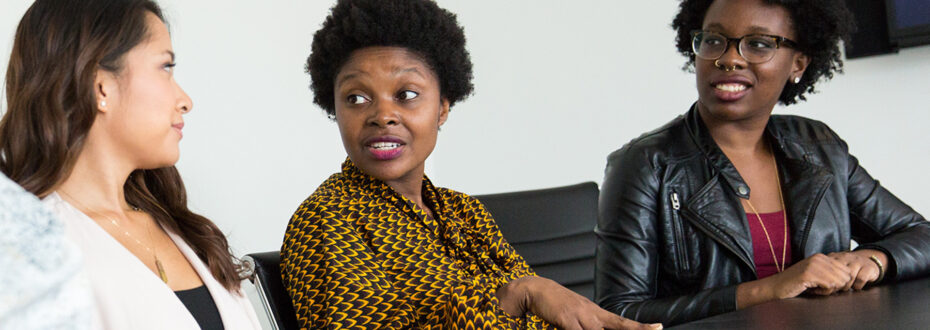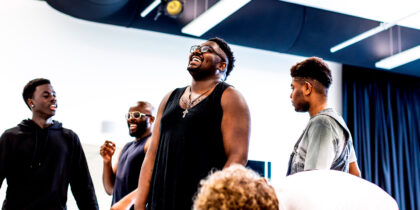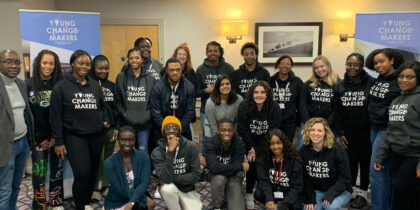By Androulla Harris
Many of the Centre’s research projects and evaluations have explored the experiences of racialised young people, and how well a programme benefits their mental health, wellbeing and skills development. We are committed to ensuring our research authentically represents the voices of those affected by social inequality, including people from racialised groups.
As part of this, we work closely with peer researchers – people who are ‘peers’ of the people whose experiences are being researched. Peer research is crucial because much research into racialised people’s experiences has been carried out by white people. This means it can be unintentionally shaped by unconscious bias against racialised people, poor cultural awareness and competency, and seeing the world through a ‘white privilege’ lens. It is crucial that the research is shaped by people who have experienced what we are studying first hand, including on issues like racism and mental ill health. At the Centre we have been influenced by recent work on white fragility. An important aspect of this is the argument of Robin DiAngelo that “white people should move from asking ‘if I am racist…’ to ‘how have I been shaped by the forces of racism?”
white researchers need to be upfront about their awareness of white privilege and race-based power dynamics… Being open to being challenged, and non-defensive when this occurs, encourages peer researchers to feel comfortable to do this.
Working on an evaluation with peer researchers can help to mitigate the inherent problems outlined above. It transforms the way research is carried out. Peer researchers help to shape how data is collected to make it more culturally relevant and engaging for research participants. When conducting interviews and focus groups, peer researchers ensure the questions being asked are the most relevant and pertinent to those participating. Peer researchers can also build stronger rapport and trust with research participants through having a closer understanding of their experiences and cultural nuances, which is also very valuable at the analysis stage. For example, as our peer researchers had directly experienced racism, they encouraged research participants to feel comfortable to open up about this important topic, and the significant impact it has on mental health.
A good example of our peer research methods is within the Shifting the Dial programme, where we evaluated community groups in Birmingham designed to support young Black men’s mental health and wellbeing. As part of this, in collaboration with the Centre’s lead peer researcher, we trained four young Black men as peer researchers, most of whom already attended the projects we were evaluating. We collaborated with our peer researchers on research design, through to data collection and analysis, and presented our findings back to the local community, academics and stakeholders.
the scarcity of measures of wellbeing which are tailored to young Black men (or women)… puts them at risk of receiving therapeutic support that is mainly shaped around white people’s needs
We found that successful coproduced outcomes rely on building trusting relationships with peer researchers and research participants. To help this process, white researchers need to be upfront about their awareness of white privilege and race-based power dynamics. They need to be curious and committed to listening to what is being said on important topics like race, culture and racism to expand their cultural knowledge. Being open to being challenged, and non-defensive when this occurs, encourages peer researchers to feel comfortable to do this. This is important because white researchers can fail to pick up on underlying dynamics or cultural nuances which are much clearer to the peer researchers.
A broader issue in research is the scarcity of measures of wellbeing which are tailored to young Black men (or women). This means there is less good quality data and evidence-based understanding of what works best to support their mental health and wellbeing. It puts young Black men at risk of receiving therapeutic support that is mainly shaped around white people’s needs. Using approaches that lack cultural sensitivity can also lead to mistrust and disengagement with services.
We were funded by Mind to coproduce with young men a new culturally appropriate approach to tracking young Black men’s outcomes when they attend a community, mental health or wellbeing programme. This is needed to ensure young Black men’s journeys with a programme are being tracked in a way which feels meaningful and relevant to them. It can also help build the evidence base for what works in supporting young Black men’s needs. This would encourage more funding to be given to projects which are proven to be effective, so more young men can benefit from culturally appropriate services. We will be publishing our findings on this project in August.
Peer research and coproduction is at the heart of many of our projects, and key features of this are to be collaborative, curious and to welcome learning from others.
Listen to our lead peer researcher, Alex Augustine, talking about this in more detail








